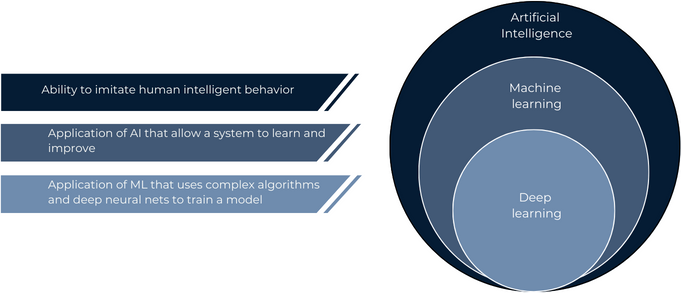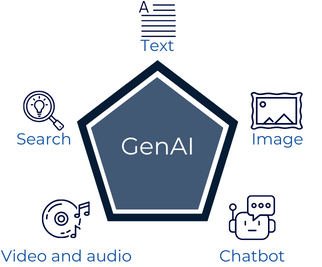AI and GenAI: What You Need to Know

In the ever-evolving technological landscape, terms like Artificial Intelligence (AI) and Generative Artificial Intelligence (GenAI) have transcended buzzword status to become foundational elements in contemporary discourse. However, with their increasing presence comes the growing need to understand what these terms entail.
Artificial Intelligence (AI)
“Artificial intelligence” (AI) is a broad term that refers to any type of computer software that engages in human-like activities. The primary objective of AI is to develop self-reliant machines that can think and act like humans. These machines can mimic human behavior and perform tasks by learning and problem-solving.
AI is generally considered to be a broad topic with several sub-fields, methodologies, and practitioners. Such sub-fields include in particular Machine Learning and Deep Learning.
Machine learning is a subfield of AI, where machines can learn from data and perform certain tasks and functions without being explicitly programmed to do so. Machine learning is primarily used to process large amounts of data quickly.
These types of AIs are algorithms that appear to “learn” over time and are useful for putting vast troves of data into a digestible context for humans.
Machine learning can rapidly analyze the data as it comes in, identifying patterns and anomalies. But machine learning is also a relatively broad category. The development of artificial neural networks – an interconnected web of artificial intelligence “nodes” – has given rise to what is known as deep learning.
Deep learning, a specialized subset of machine learning, utilizes neural networks for non-linear reasoning. It's essential for executing sophisticated tasks like fraud detection by simultaneously assessing numerous factors.

When it comes to the broad term AI, a lot of distinctions can be made. For example, a general differentiation in the realm of AI is between general and specialty AI.
General AI embodies the concept that software can showcase wide-ranging intelligence, much like humans, reasoning across diverse domains.
In contrast, specialty AI is rooted in the notion that software can be fine-tuned to address and resolve distinct, specific tasks. Such tasks might encompass identifying particular images or customer behavioral patterns, pinpointing potential equipment malfunctions, or spotting specific fraudulent activities. The progression in the specialty AI domain has been meteoric over the past few years.
Generative AI
Generative AI (GenAI) is different from traditional AI, as “GenAI” is designed to generate (as the name suggests) content or data that looks and feels like the content and data that the models were trained on.
GenAI is built for creating original output by learning from data patterns. It uses neural networks to identify the patterns and structures within existing data to generate new and original content.
GenAI models have ushered in a revolution by harnessing varied learning techniques, such as unsupervised and semi-supervised learning for training.
This has enabled organizations to efficiently utilize vast amounts of unlabeled data to establish “foundation models”.
Prominent examples of foundation models are GPT-4 and Stable Diffusion. ChatGPT can craft an essay from a brief text prompt. Similarly, Stable Diffusion has the capability to produce lifelike images from textual descriptions.
GenAI has the potential to completely transform businesses with its capacity to make sense of vast amounts of data, demonstrate human-level accuracy in language understanding, and generate complex content and data, hence freeing time allocation to more impactful value creation and less task iterations.
Indeed, with language commands (‘prompts’), you can direct GenAI to draft documents content, text, data analysis, create software code, design, videos, human-like voices, and more.

At Lampi, we're passionate about enabling businesses to fully leverage the potential of AI.
Our experts are always ready to guide you on your AI journey, helping you understand and navigate the complex world of AI.
So, why wait? Step into the future with Lampi and embark on your AI journey today!
Don't forget to follow us on Twitter, Instagram, and Linkedin!

